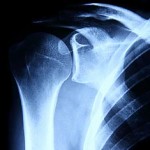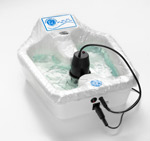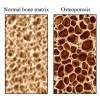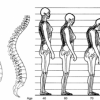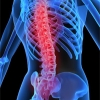Porous, thin or weakened bones can be prevented and reversed. Here are some new, natural and effective bone building strategies:
1) Attempt to eat more absorbable forms of calcium and minerals, preferably in the form of raw food. The following foods contain calcium, magnesium, boron, copper, iodine, silicone, manganese, zinc, and chromium which are all good for bone health:
- Spirulina/algae
- Spinach
- Broccoli
- Kale
- Nettles
- Green leafy vegetables
- Sea vegetables (dulse etc.)
- Hazelnuts, brazil nuts, & figs
2) Maintain an alkalizing diet for good pH balance.
If your body becomes too acidic, a condition known as acidosis can occur. Calcium, a potent alkalizer, can be drawn out of the bones to “buffer” excess acid, and this contributes to bone loss. The human body prefers to be in a slightly alkaline state. This means we must provide it with good alkalizing foods to keep it in a state of balance.
The ideal pH of the blood is 7.365 and can be measured using new blood tests. A good alternative method is testing your saliva or urine with pH paper. For over 20 years I have been promoting the concepts of pH balancing, and now there is a tremendous amount of literature to support the benefits of providing your body with the right ingredients to create an acid/alkaline balance. Research has shown that normal pH levels for most tissues and fluids in our bodies are alkaline. Here is a condensed version of what we have learned:
- The human body functions in its optimum state when it has lots of alkalizing foods and water to keep all bodily fluids in a state of balance known as homeostasis. This state helps the body to have more energy, lowers the incidence of headaches, joint stiffness and pain. It is also very helpful in preventing bone loss and in treating the root causes of Cellular Dysfunction (ie, cancer).
- The body has a tendency to become more acidic due to metabolic actions such as breathing, (carbonic acid) and exercising, (lactic acid) and it needs a constant supply of alkalizing foods and water to maintain homeostasis.
- From a food perspective, this means there needs to be approximately 70-80% alkalizing foods in your diet, and approximately 20-30% acidic foods. Here is a short list of common alkaline foods:
- Most fruits and veggies
- Uncooked or lightly steamed veggies are preferable such as: spinach, kale, celery, broccoli, carrots, fennel, and onions
- Green aquatic plants, such as algae & kelp
- Some nuts, such as almonds and walnuts
- Some grains such as spelt
- Alkalized water (pH of 7-10.5)
If you are looking for a great bone building program, check out my Healthy Bone Program.
